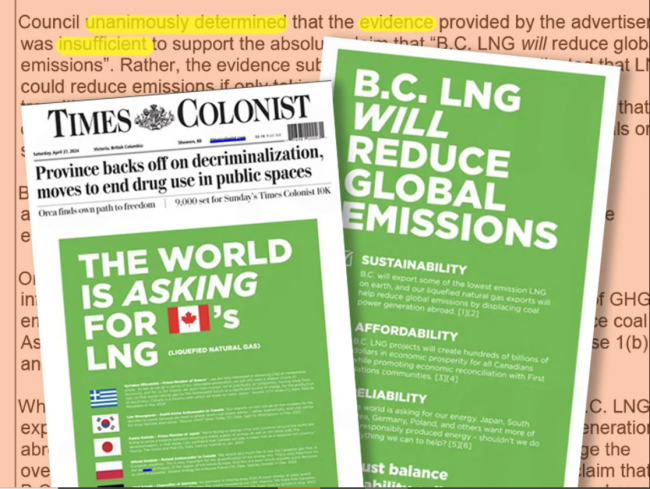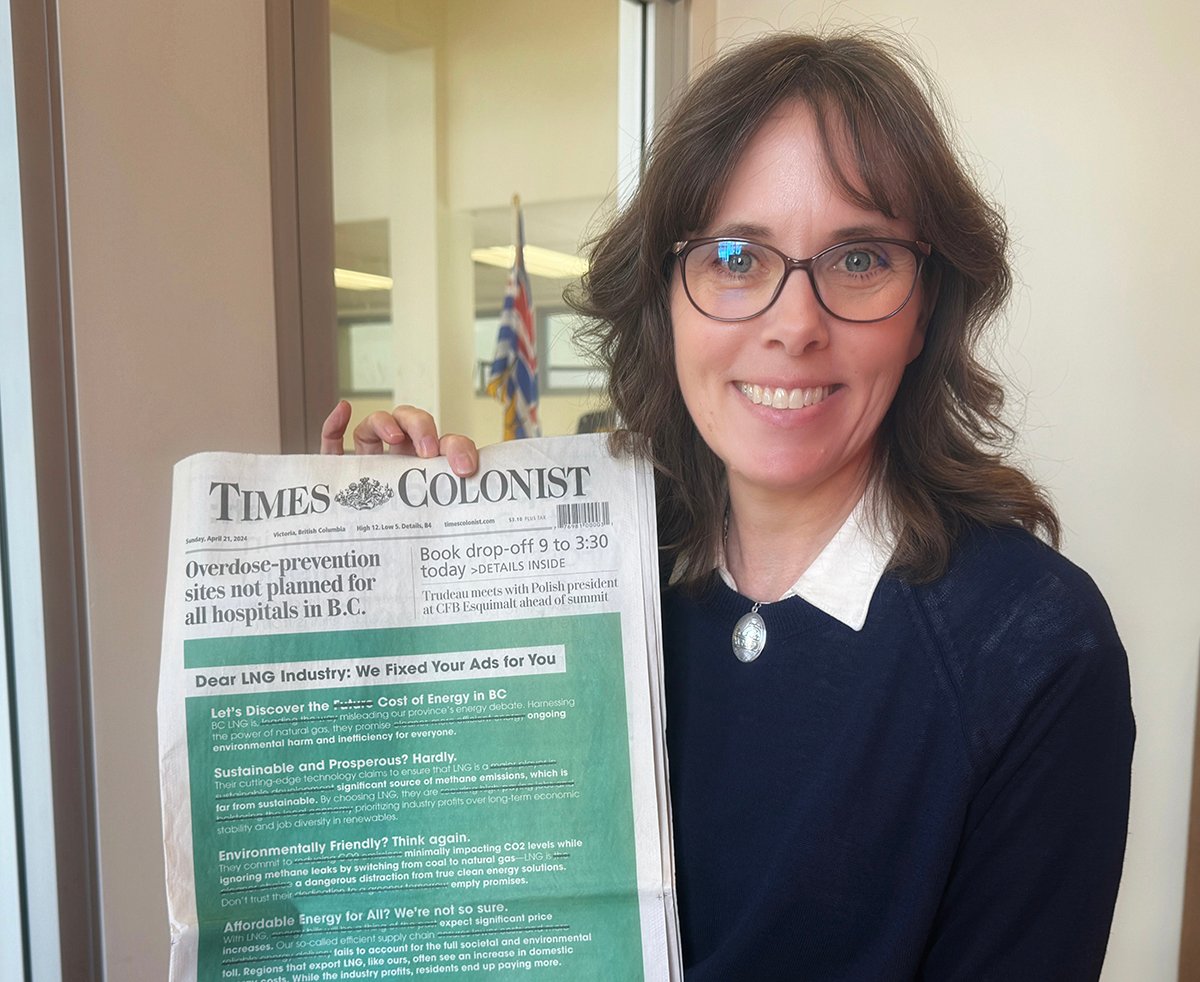Articles Menu

May 31, 2024
After an interim decision was leaked earlier this week, Ad Standards Canada says it will not make public the final outcome of its investigation into allegations of greenwashing against oil and gas advocacy group Canada Action Coalition.
The interim decision, which is dated Jan. 30 but was released to the complainants and Canada Action Coalition only earlier this month, unanimously found that Canada Action Coalition gave an “overall misleading impression that B.C. LNG is good for the environment, amounting to greenwashing.”
In a statement, Canada Action Coalition said it is appealing the decision.
But the outcome of that appeal will not be released to the public, Ad Standards said.
That move isn’t sitting well with those calling for action on greenwashing by the oil and gas industry.
Leah Temper, health and economic policy program director with the Canadian Association of Physicians for the Environment, or CAPE, said Ad Standards’ decision to withhold its findings in the current case “further undermines their credibility.”
“If ads are being found to be false and misleading, what is the mechanism for correcting the public record?” Temper said. “We’re in these key critical moments and policymakers and the public are being swayed by these ads.”
Temper added that the only way the public is likely to know the outcome of the appeal and the council’s final decision is if the ads continue to run.
While CAPE released the interim decision on its website, it didn’t make the complaint. Temper said the issue was raised by “multiple complainants,” who remain anonymous.
Ad Standards is a national non-profit tasked with self-regulation for the advertising industry. It weighs advertising complaints against the Canadian Code of Advertising Standards, making its decisions public only when non-compliance is found. It can ask an advertiser to withdraw its ads and, if it refuses, notify media hosting the ads and Canada’s Competition Bureau of its findings of non-compliance.
According to the leaked decision, the complainants alleged that ads running prominently on city buses, billboards and front- and back-page wraparound ads in major daily newspapers such as Victoria’s Times Colonist and the Vancouver Sun “promoted misinformation about the impact that liquefied natural gas (LNG) has on the climate.”
The independent council reviewing the complaint agreed that phrases like “B.C. LNG will reduce global emissions” were misleading.
“By using the word ‘will,’ council unanimously determined that all of the advertisements promised a verified result without competent and reliable evidence,” the council wrote. “No evidence was provided to support the expected increase in LNG demand.”
As a result, the claims violated clauses of the Canadian Code of Advertising Standards related to accuracy and reliable evidence, the council determined. Some council members also agreed that the ads’ bright green background was an attempt to make the projects appear “eco-friendly.”
LNG refers to gas extracted through hydraulic fracturing, or fracking, which is shipped by pipeline and liquefied. Once processed, it can be loaded onto specialized tankers for overseas export.
B.C. does not currently export LNG. But several projects in the province are in various stages of approval and construction.
The most advanced of those is the controversial Coastal GasLink pipeline. The project will connect to the LNG Canada plant in Kitimat, which is expected to begin exporting next year.
LNG proponents argue that shipping Canadian gas overseas will help China reduce its reliance on carbon-intensive coal-fired power plants, thereby lowering global greenhouse gas emissions. It’s an argument supported by industry advocacy groups like the Canadian Association of Petroleum Producers and Alberta’s Canadian Energy Centre.
But evidence for the argument is slim.
Fossil fuel opponents point out that there is no formal commitment from China to use Canadian gas for power production and that the country is rapidly transitioning to renewable energy sources without the need for LNG as a “bridge fuel.” Critics also say that calculations showing LNG emits less carbon don’t include methane leaks that occur during extraction, production and shipping.
Canada Action Coalition founder Cody Battershill declined The Tyee’s interview request, instead providing a two-page written statement.
The statement doubled down on claims that B.C. LNG would reduce global emissions, while not directly addressing Ad Standards’ findings that these claims were unsubstantiated. Instead, the statement focused on Canada’s “stringent fugitive methane regulations” and access to renewable power sources, saying they would lower emissions regardless of overseas exports.
“The messaging we utilize in advertisements, such as [ads] in B.C. on how the province’s LNG sector will help reduce emissions, is grounded in facts,” the statement said, adding that its information “is taken from only the most credible and reputable sources.”
Canada Action Coalition did not provide these sources in its statement.
In its decision, Ad Standards found that Canada Action’s ads had “distorted” the findings of experts in sources it provided to the council for its investigation.
Canada Action describes itself as “a non-partisan, grassroots-built organization dedicated to creating and nurturing balanced, honest and fact-based discussions on Canada’s world-class natural resources.” The organization says it “combats misinformation” about natural resource industries, including mining, oil and gas, forestry and renewables.
But investigations by the Narwhal have found the organization has “deep ties” to both the oil and gas industry and the federal Conservative party, including a $100,000 contribution from oil and gas developer ARC Resources in 2020.
Financial statements posted by the federal government show that the organization’s revenue averaged more than $1.6 million annually between 2018 and 2022, most of it from undisclosed sponsorships. It spent much of that funding — about $1 million a year — on marketing campaigns.
The most recent campaign caught the attention of the BC Greens last year because of its striking resemblance to the BC Greens’ branding, leader Sonia Furstenau told The Tyee.
In March, the BC Greens introduced legislation — similar to that introduced by the federal NDP — calling on B.C.’s NDP government to ban fossil fuel advertising in the province.
After Canada Action Coalition published its ads, the BC Green Party followed with its own wraparound ad in the Times Colonist countering Canada Action’s claims.
There was a feeling from the public that “nobody’s doing anything to correct the record,” Furstenau said.

In the B.C. legislature earlier this month, Furstenau called on Premier David Eby to prevent greenwashing from the fossil fuel industry, noting that Canada Action Coalition had also used images of and quotes from the premier and Energy, Mines and Low Carbon Innovation Minister Josie Osborne in its advertising.
Eby responded by pointing to B.C.’s Business Practices and Consumer Protection Act and the federal Competition Bureau, which is currently investigating similar allegations of greenwashing, as existing avenues for addressing misleading advertising.
The Tyee reached out to the premier’s office and the Energy Ministry for further comment. The premier’s office did not send a response prior to deadline. The Energy Ministry echoed what Eby said in the legislature, underscoring the Competition Bureau and Consumer Protection BC as options for consumers who wished to “raise concerns about deceptive advertising.”
“It’s disappointing that the provincial government is choosing to sit on the sidelines when they should be insisting on stopping this kind of harmful false advertising,” Furstenau said.
Temper told The Tyee that CAPE currently has greenwashing complaints pending with the Competition Bureau, including against the Canadian Gas Association, and is supporting a Greenpeace complaint against Pathways Alliance.
But she said the process can take up to four years to complete.
“In the interim, this sea of disinformation is ramping up,” Temper said. “It simply doesn’t make sense to continue to promote these products that are leading to climate disasters and also many other health and environmental impacts.”
CAPE is considering raising the Canada Action ads with the Competition Bureau, but has not yet decided next steps, Temper said.
Amanda Follett Hosgood is The Tyee’s northern B.C. reporter. She lives in Wet’suwet’en territory. Find her on X @amandajfollett.
[Top: Claims made about LNG in wraparound ads that ran in major daily newspapers, including the Victoria Times Colonist, could not be substantiated by Ad Standards Canada, a leaked document reveals. Ads from the Times Colonist. Collage by The Tyee.]